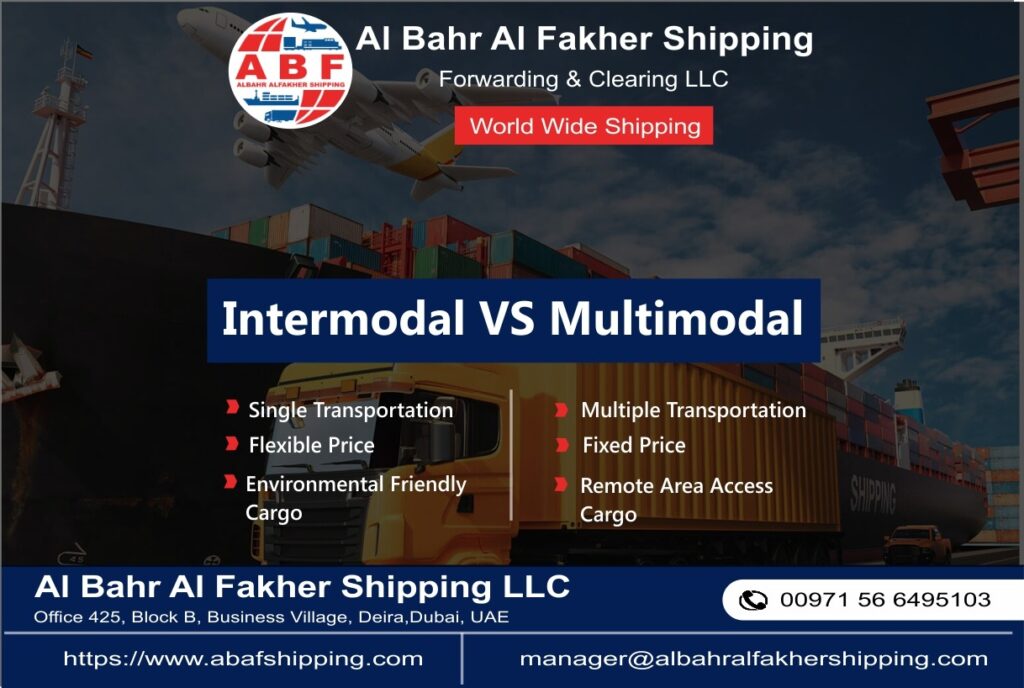When moving goods from one location in one country to another location in a different country, intermodal transportation refers to the combining of two or more modes of transportation.

Intermodal vs. Multimodal Transportation: Find out Who’s Best?
Before you set sail, it’s critical that you optimize your shipping route and overall prices. Sometimes the greatest way to reduce the overall shipping cost is to combine many different transport services. But better coordination of logistics is required. A single carrier, on the other hand, might accomplish the optimal route and necessitate less documentation. Nevertheless, the type of your cargo and you will determine what to utilize. We’ll provide advice on what to choose for your upcoming cargo in this article.
In order to get delivery from door to door, it’s crucial to choose the finest transportation method while delivering your goods from one location to another. At this point, choosing between multimodal and intermodal modes of transportation becomes important.
When selecting a carrier for your cargo, it’s critical to comprehend the distinction between the two. These terms are frequently used erroneously or interchangeably, which causes misunderstanding. Let’s get started and examine the distinctions between multimodal and intermodal transportation to help you comprehend it clearly.
Intermodal Transportation: What is it?
When moving goods from one location in one country to another location in a different country, intermodal transportation refers to the combining of two or more modes of transportation. The fact that each step of the process is contracted with a different supplier is the primary characteristic of the intermodal transportation method. Let’s find out further about intermodal transportation with the help of an example.
Example of Intermodal Transportation
To further comprehend the concept, let’s take an example. You wish to transport cargo from Dubai to India. Initially, the cargo would be picked up by a vehicle that you had hired that would bring an empty container. The truck transports the container to a railroad yard in Dubai where it is fully loaded before being transported from Jebel Ali Port. Then it is loaded into a container ship. Up till your package arrives in India, your carrier assumes complete responsibility.
The container is picked up from the container terminal at the destination (India) and delivered to the recipient by a truck that you again booked. The containers are unloaded right here.
As there are many contracts between the buyer and seller as well as between various transport service providers (truck, rail, and sea), this operation qualifies as an intermodal one.
Advantages & Disadvantages of Intermodal Transportation
An intermodal mode of transportation sure sounds efficient but as a shipper, you need to be aware of both the benefits and disadvantages. This will help you understand your needs better and make an informed decision. You don’t want to end up paying for things you don’t want, right?
Let’s quickly see the advantages and disadvantages of Intermodal Transportation services:
Advantages of Intermodal Transportation
- Carrier of Your Choosing: Every step of the shipping process gives you the option to choose your own carriers.
- Low-Cost Transportation: Utilizing intermodal transportation can help you cut transportation costs. For instance, compared to other means of transportation, rail and truck consume less fuel, which significantly lowers the economic impact. Additionally, each mode fits the shipping containers without difficulty and enables seamless switching. Because it takes less work to transfer the shipment from one mode to the other, this reduces costs.
- Economical and Guaranteed Quality: Due to its affordable price, multimodal transportation is favored by many businesses. Due to its dependable capability, its popularity has been rapidly increasing over time. The high level of service provided by multimodal transportation is another benefit. It is regarded as one of the swiftest services that guarantee trustworthy and secure freight dispatch.
- No Harm to Environment: A huge amount of freight moved a mile by rail reduces carbon dioxide and carbon monoxide emissions by almost 83%. That’s a significant sum! Intermodal shipping undoubtedly aids in lowering a shipment’s overall carbon impact.
Disadvantages:
- The cargo is moved around a lot during intermodal transport methods, which slows down the overall process. In addition, some modes of transportation might not offer a straight path or be extremely slow. All of these variables may cause time and speed losses, which would hinder the movement of cargo during intermodal transportation.
- Given that this mode of transportation depends on numerous routes of transportation, a disruption in any one of them could have an impact on the entire process. In essence, it has a chain-reaction effect.
- Due to the frequent moving and handling is involved, the chance of damage is slightly higher. Even if the likelihood is considerably – reduced, it is still possible. At this point, preemptive planning can lessen unexpected dangers.
- It’s not easy to handle containers! To move big boxes, you require heavy machinery like a crane or forklift. Intermodal transportation requires handling infrastructure and machinery (warehousing facilities, rail access, inland roads, cranes, etc.), but they are complex and expensive.
When is Intermodal Transportation the Best Choice?
Intermodal transportation services can serve the best when:
- When your cargo has a weight of less than 25 tons.
- The cargo has an intermediate value
- When the distance to be covered is more than 3 miles in one day
- Your freight flow is constant, regular, and headed in the same direction
- When you’re in need of environment-friendly cargo servic
What is Multimodal Transportation?
Based on the definition, multimodal transport (also known as combined transport) is the integration of at least two and maybe more different means to transport your cargo from one country to another. The primary distinguishing feature of multimodal transportation is that, despite utilizing many modes of transportation, it is still subject to a single bill of lading. This means that regardless of whether the conveyance is carried out by air, rail, or sea, the transporter is entirely responsible for it.
Example of Multimodal Transportation
Let’s try to elaborate on it with the help of an example.
Suppose you are using multimodal freight that travels from Dubai to Karachi. The transporter sends their own licensed trucking company to pick up the containers in Dubai after the goods have been packed in the containers. It is then transported to the Jebel Ali Port. The trucking company that functions under the carrier picks it up in Karachi and delivers it there once more.
From the point of pickup through the point of delivery at the destination, the carrier undertakes complete liability. Only one contract is required for the entire process.
Advantages & Disadvantages of Multimodal Transportation
In many aspects, multimodal transportation is effective, but as a shipper, you must be aware of its advantages and limitations. You can then decide on the best course of action after better understanding your needs. Let’s quickly review some of the benefits and drawbacks:
Advantages:
- The expense of a shipper’s coordination is reduced
- There is a duty for centralization, primarily on the logistics company. The movement is handled by a single carrier.
- The delivery is made faster because multiple modes of transport are combining
- It is more feasible and involves less logistical work from the supplier to have a single contract
Disadvantages:
- On a particular section of the route, you might not have a choice in the sub-carrier
- There are no chances for negotiations for each carrier
Intermodal Vs Multimodal Transportation: Who’s the Best?
When you select multimodal transportation, you commit to a single carrier for the duration of the shipment’s voyage. A Multimodal Bill of Lading or a Combined Transport Bill of Lading is issued by the contracted carrier. Delivery times are improved, inventory costs are decreased, and the level of freight expenses is kept under control with intermodal and multimodal transportation.
However, a lot of individuals choose multimodal shipping since it gives shippers access to a quicker, more affordable shipping option. Given that it is covered by a single contract, multimodal freight may be simpler to handle. Therefore, before selecting a method of transportation based solely on its advantages, consider your demands first.
Here’s a little recap of what we have discussed about intermodal and multimodal transportation services:
Intermodal Transportation | Multimodal Transportation |
| Uses various contracts with numerous suppliers; each carrier generates a different bill of lading. As well as additional paperwork for every exchange. | Regardless of the number of modes of transportation, it uses a single contract with a single carrier to convey cargo. |
| Each company’s shipping manager is free to select the most advantageous price for each contract. | The management must agree to stick with a specific price for the duration of the trip. |
| Shippers to take responsibility for shipments | Here, carriers are the ones responsible for shipping |
| By selecting green carriers, shippers lower their carbon footprint. | Remote areas in the world are easily accessible. |
| uses a single transportation unit in the entire journey | involves using a variety of units in various modes |
